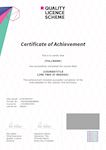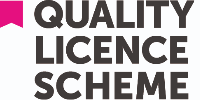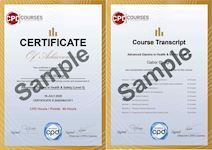Accounting : Accountancy Training
QLS Level 5|*FREE PDF Certificate* |130 CPD Points |*Profit/Loss Account & Accounting Concepts & Standards FREE Courses
Brentwood Open learning College
Summary
- Exam(s) / assessment(s) is included in price
- Tutor is available to students
Add to basket or enquire
Overview
Accountancy
*** 3 Courses Bundle***
Certificate in Accounting and Finance QLS Level 5. Additional CPD Accredited Accountancy Certificate with 130 CPD points available with no extra study. This Accountancy course comes with easy to understand e-learning study materials.
**FREE P&L Account Course**FREE Accounting Concepts and Standards**
What Will I Learn From This Accountancy Certificate:
This exclusive Accountancy Online Course has been designed for ambitious candidates looking to lay a strong foundation for further studies, or to begin working towards a career in accountancy. Suitable for newcomers and existing members of the workforce alike, business owners and entrepreneurs could also benefit from professional-quality accountancy skills. By studying the key duties and responsibilities of working accountants, candidates are primed and readied to begin writing their own success stories.
Over the course of four insightful modules, learners are gradually introduced to the mechanics of corporate accountancy, along with an exploration of the importance and potential value of proactive financial management. A series of key financial reports are investigated in-depth, along with a variety of financial analysis tools and the different types of accountancy. Business budgeting is also introduced and explored from a contemporary corporate perspective.
Key skills, talents and knowledge picked up along the way include:
- Detailed knowledge of the contemporary accountancy profession
- Understanding of key accountancy concepts and standards
- Familiarity with basic accountancy journals and documents
- The confidence to pursue a career in accountancy
*** 2 Free Gifts included in the Accountancy Course ***
***FREE P&L Account Course***
This Free P&L Account course covers the following topics:
- Meaning of the Statement of Profit or Loss
- Measurement of Income
- Relation Between Statement of Profit or Loss and Statement of Financial Position
- Important Terminology
- Preparation of Profit and Loss Accounts
- Plus more
***FREE Accounting Concepts and Standards Course Course***
This Free Accounting Concepts and Standards Course covers the following topics:
- Accounting Concepts & Standards
- Business Entity Concept
- Money Measurement Concept
- Cost Concept
- Attempts Towards Standardisation
***This offer ends soon***
Accountancy Certificate in Level 5. Endorsed Certificate of Achievement in Accounting, interested in starting a rewarding new career in Accounting and Account Management? Study from home in your own time and at your own pace for an endorsed Accountancy Level 5! This exclusive Accountancy Level 5 Course has been designed for newcomers to accountancy and finance, providing an insightful introduction to this dynamic specialism. This Level 5 Accounting and Finance Course could be the start of an incredible career.
Across both public and private sectors alike, accurate accountancy is of universal importance. Irrespective of the size, type or nature of the business, accounts and finances need to be flawlessly managed. Even if the business in question is a non-profit organization, consistent accountancy and financial management are mandatory. Just as quality accountancy can directly contribute to stronger financial performance, substandard accountancy can cause even the largest organisations to fail. Which is why, those who develop advanced accountancy skills are considered to be assets of priceless value by employers and business owners worldwide.
This Advanced Level 5 in Accountancy course is designed to lay the groundwork upon which to begin building a rewarding career in accountancy. Whether looking to continue studying at a more advanced level, pursue an entry-level accountancy position or further an existing career, this endorsed course could make all the difference.
With the commitment of your own personally-assigned tutor and the Brentwood Open Learning College support team, the accountancy career of your dreams could be right at your fingertips!
Quality Licence Scheme
This Accounting and Finacne course is endorsed by the Quality Licence Scheme. The Quality Licence Scheme, endorses high-quality, non-regulated provision and training programmes.
Achievement
CPD
Course media
Description
Accountancy
Learning Outcomes
Accounting - Diploma units take students from the basic Accounting fundamentals to the various Accounting concepts used by the accountants for keeping records of the capital expenditure of a company. From understanding debits and credits and using simple T-Accounts to closing out the Accounts at the end of an Accounting period, producing the statement of retained earnings and balance sheet, you will learn how each step is completed.
Accounting course completion the learner should be able to;
- Explore the roles, advantages and limitations of contemporary corporate Accounting.
- Understand core duties and responsibilities of an Accountant
- Discuss four main types of financial statements;
- Identify and describe the three basic forms of business organizations;
- Understand how to work with t-Accounts and journals;
- Understand how to organize and record financial transactions;
- Outline the steps in the Accounting cycle;
- Explain how to close out a set of Accounts using a worksheet;
- Describe how to prepare a classified balance sheet;
- Understand what are sales variances, overhead variances, labour variances and cost variances
- Explain how to determine optimal cash balance.
Diploma Course Syllabus:
The Accountancy Diploma consists of the following units:
Unit 1 - Introduction to Accounting
This Accountancy unit covers the following key topics:
- Accounting and Finance
- Accounting
- Objectives of Accounting
- Scope of Accounting
- Functions of Accounting
- Advantages of Accounting
- Limitations of Accounting
- Evolution of Modern Accounting
- Branches of Accounting
- Modern View of Accounting
- Accounting Cycle
- Plus more
Unit 2 - The Role of An Accountant
This Accountancy unit covers the following key topics:
- Role of an Accountant
- Methods of Accounting
- Debit and Credit
- Types of Accounts
- Distinction between Book-Keeping and Accounting
- Organisation for Accounting and Finance
- Bases of Accounting
- Accounting Terminology
- Plus more
Unit 3 - Accounting Concepts and Standards
This Accountancy unit covers the following key topics:
- Concepts of accounting
- Accounting Framework
- Standards of accounting
- Plus more
Unit 4 - Journals and Subsidiary Books
This Accountancy unit covers the following key topics:
- Journal And Subsidiary
- Advantages of Journal
- Sub-Division of Journal
- Ledger
- Distinction between Journal and Ledger
- Subsidiary Books
- Basic Document for Subsidiary Books
- Advantage of Subsidiary Books
- Imprest System
- Plus more
Unit 5 - Profit And Loss Accounts
This Accountancy unit covers the following key topics:
- Statement of Profit and Loss
- Measurement of Income
- Preparation of Profit or Loss Account
- Plus more
Unit 6 - Balance Sheet
This Accountancy unit covers the following key topics:
- Balance Sheet
- Purpose of Financial Statements
- Prepare a Balance Sheet
- Assets
- Analyze a Balance Sheet
- Current Ratio
- Quick Ratio
- Working Capital
- Debt/Worth Ratio
- Plus more
Unit 7 - Cash Flow Statements
This Accountancy unit covers the following key topics:
- Cash Flow
- Initial Investment
- Cash
- Receivables
- Inventory, Supplies, and Prepaid Expenses
- Sources of Funds
- Funds from Operations
- Uses and Application of Funds
- Plus more
Unit 8 - Budgeting
This Accountancy unit covers the following key topics:
- Budget
- Financial Planning
- Budgetary Control
- Installing a Budgetary Control System
- Responsibility for Budgeting
- Key Factor
- Sales Work Sheet
- Fixed and Flexible Budgets
- Plus more
Unit 9 - Variance Analysis
This Accountancy unit covers the following key topics:
- Variance
- Types of Variance
- Direct Material Variances
- Computation of Labor Variances
- Control of Variances
- Variance Reporting
- Plus more
Unit 10 - Ratio Analysis
This Accountancy unit covers the following key topics:
- Classification of Ratio
- Norms for Evaluation
- Managerial Uses of The Primary Ratio
- Plus more
Unit 11 - Financial Management
This Accountancy unit covers the following key topics:
- Introduction to Financial Management
- Categories of Financial Management
- Scope of Financial Management
- Finance Functions
- Finance and Accounting
- Plus more
Unit 12 - Management of Working Capital
This Accountancy unit covers the following key topics:
- Significance of Working Capital
- Operating Cycle
- Concepts of Working Capital
- Kinds of Working Capital
- Components of Working Capital
- Importance of Working Capital Management
- Determinants of Working Capital Needs
- Approaches to Managing Working Capital
- Measuring Working Capital
- Working Capital Management Under Inflation
- Efficiency Criteria
- Plus more
Unit 13 - Investment Methods
This Accountancy unit covers the following key topics:
- Introduction to Investment Methods
- Types of Investment Proposals
- Project Report
- Methods of Appraisal
- Depreciation, Tax, and Inflows
- Cost of Capital
- Limitations of Investment Appraisal Techniques
- Plus more
Who is this course for?
Accountancy
- Candidates interested to start a career in accountancy
- Business owners seeking to look after their own accounts
- Existing accountancy workers in seeking for higher positions or promotion
- Accountancy workers with no formal qualifications
- Anyone wishing to boost their career prospects.
Requirements
Accountancy
There is no particular entry requirement.
Option 1
Accounting & Finance Diploma QLS Level 5 endorsed by Quality Licence Scheme
Certificate Fee: £120 + postal charges
Option 2
Accountancy Diploma issued by BOLC
PDF Certificate - FREE
Hard copy - £25 + postal charges
Option 3
CPD Accredited Certificate
(PDF format)=£30
(Hard copy)=£95 + postal charges
*Postage Charges: National £9, International £15
Career path
Accountancy
After completing Accountancy Level 5, Opportunities for employment may include working as an:
- Accounts Assistant
- Accounts Payable & Expenses Supervisor
- Accounts Payable Clerk
- Audit Trainee
- Payroll Administrator / Supervisor
- Tax Assistant / Accountant.
- Accounting Clerk
- Accounts Receivable Clerk
Questions and answers
Currently there are no Q&As for this course. Be the first to ask a question.
Reviews
Legal information
This course is advertised on reed.co.uk by the Course Provider, whose terms and conditions apply. Purchases are made directly from the Course Provider, and as such, content and materials are supplied by the Course Provider directly. Reed is acting as agent and not reseller in relation to this course. Reed's only responsibility is to facilitate your payment for the course. It is your responsibility to review and agree to the Course Provider's terms and conditions and satisfy yourself as to the suitability of the course you intend to purchase. Reed will not have any responsibility for the content of the course and/or associated materials.





